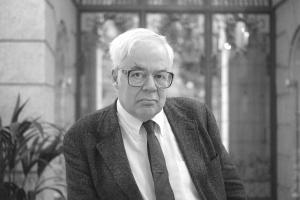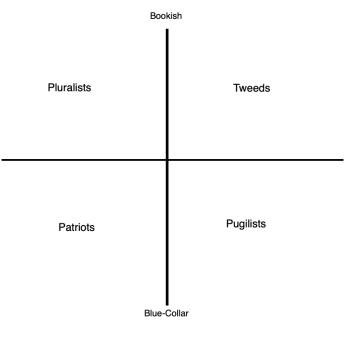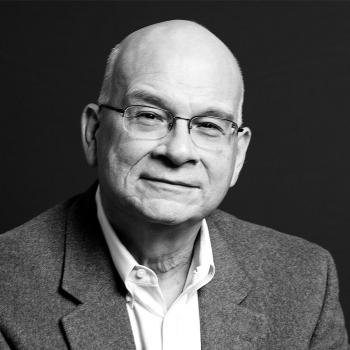
Not long ago, I was reading Michael Millerman’s excellent recent book Beginning with Heidegger, which chronicles various receptions of the controversial German thinker, and encountered a philosophical figure I hadn’t thought of in a long while: Richard Rorty.
I first came across Rorty in the course of my high school worldview studies, where he was cited as an exemplar of “postmodernism.” To a certain extent, that characterization holds. As a thoroughgoing pragmatist, Rorty was explicitly antifoundationalist, rejecting any attempt to root his social-democratic political commitments in metaphysical realities such as being or truth. If postmodernism simply means “postmetaphysical” thinking in this sense, then yes, Rorty can be called postmodern. But to my mind, the designation “postmodern” typically connotes an element of oppositionality or rivalry against the status quo, rather than its sanctification. At their best, writers like Herbert Marcuse and Michel Foucault are arresting precisely because they call into question the terms and concepts taken for granted by modern mass culture, and in so doing suggest that other social and political configurations are possible. And this is exactly what Rorty does not do.
Today, the axioms of his general project seem so familiar as to be almost banal. Rorty endorses “power in the service of love—technocratic manipulation in the service of a Whitmanesque sense that our democratic community is held together by nothing less fragile than social hope.” On this view, tradition does not establish guardrails for, or direct the course of, individual actions, but rather “needs to be utilized, as one utilizes a bag of tools” to achieve predetermined (for Rorty, social-democratic political) ends.
Absolutizing claims and the institutions that incubate them should be conveniently jettisoned as promptly as possible: those of Rorty’s persuasion “would prefer to have no high altars” in their ideal society, but would like to “instead just have lots of picture galleries, book displays, movies, concerns, ethnographic museums, museums of science and technology, and so on—lots of cultural options but no privileged central discipline or practice.” Rejected here on principle, obviously, is the old notion of theology as “queen of the sciences.”
In short, Rorty’s ideal seems to be a kind of philosophical modernity that is self-consciously ungrounded, entirely unconcerned about the analytical holes that inevitably emerge with scrutiny. (Why, for instance, are social-democratic politics to be preferred over others? Better, for Rorty, not to ask that question.) At their worst, serious philosophical debates call cherished political ideals into question, which is essentially taboo; at their best, they’re distractions from the larger technocratic project. To borrow a familiar online idiom: maybe we should all just live in the pod and eat the bugs, if that’s what seems to work best.
For all intents and purposes, Rorty’s philosophy seems like a particularly uncanny description of the presently dominant left-liberal political milieu. While certain elements of more radical postmodern critiques have been assimilated into the way people speak (the “Great Awokening,” in the course of which ideals like “objectivity” have been denounced), prior power structures remain mostly intact. Few white CEOs, for instance, are abdicating their positions in favor of colleagues of color. As far as fundamental questions are concerned, casual disregard for metaphysics seems to be commonplace; the real ballgame is the project of shoring up the status quo, in one way or another.
It seems to me that something like Rorty’s utopia of pragmatism—one that tries to improve policy outcomes at the margins and doesn’t think too hard about the underlying value questions—is perhaps a more robust description of a “decadent society” than the one offered, say, by Ross Douthat in his 2020 book on the subject. In such a context, it would seem that a fundamental question for Christian witness is the question of why “comprehensive” intellectual integrity matters in the first place—or, spelled out more fully, why it matters that all human knowledge presents fundamental questions of anthropology, interdisciplinary unity, and ends-directedness, which are consummately theological topics that bottom out in theological premises.
How might such an argument proceed? For one thing, only on the basis of a more-or-less coherent metaphysics can an individual make moral decisions in the absence of external social cues. Indeed, in a culture that places high value on self-expression, persistently adopting a go-with-the-flow approach to moral reasoning paradoxically ensures that no “self” capable of choosing a moral course can ever emerge—the opposite of the ideal. (Phrased in more traditional terms: attaining maturity as a person requires developing virtue through the actualization of one’s potentialities.) All of this is to say that the fully actualized sort of person that a Rortyan social-democratic culture seeks to produce, a person capable of leading a democratic political community, can only emerge if one rejects Rorty’s own blasé approach to “first things.”
But perhaps this is too abstract. Perhaps it’s enough to note that, across the vast landscape of “picture galleries, book displays, movies” and what have you, the stories that resonate most deeply are those that force to the surface the very “absolute” questions that Rorty would like to exclude. Vast tracts of post-Christian culture are, at the very least, “God-haunted,” from the panpsychist spirituality of James Cameron’s Avatar to the eschatological edges of today’s climate fiction. The aesthetic weight of ultimacy, of final judgment and final consummation, cannot so easily be forgotten. And thus, even within the very heart of decadence, the flame of the eternal still burns.
In many sectors of the West, Rorty’s vision may have carried the day, for now. But the cracks in the foundation are growing wider.












